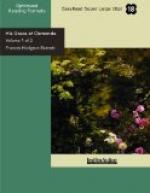“Ay,” answered she, “but ’twas not that I meant. I thought of all this child is born to—love and wealth and learning—and that others are born to naught but ill.”
“Lawk! let us not even speak of ill on such a day,” said her neighbour. “Look at the sky’s blueness and the spring bursting forth in every branch and clod—and the very skylarks singing hard as if for joy.”
“Ay,” said Joan Bush, “and look up village street to the Plough Horse, and see thy Gregory and my Will and their mates pouring down ale to drink a health to it—and to her Grace and to my lord Duke, and to the fine Court doctors, and to the nurses, and to the Chaplain, and to old Rowe who waits about to be ready to ring a peal on the church bells. They’ll find toasts enough, I warrant.”
“That will they,” said Dame Watt, but she chuckled good-naturedly, as if she held no grudge against ale drinking for this one day at least.
’Twas true the men found toasts enough and were willing to drink them as they would have been to drink even such as were less popular. These, in sooth, were near their hearts; and there was reason they should be, no nobleman being more just and kindly to his tenants than his Grace of Osmonde, and no lady more deservedly beloved and looked up to with admiring awe than his young Duchess, now being tenderly watched over at Camylott Tower by one of Queen Catherine’s own physicians and a score of assistants, nurses, and underlings.
Even at this moment, William Bush was holding forth to the company gathered about the door of the Plough Horse, he having risen from the oaken bench at its threshold to have his pewter tankard filled again.
“’Tis not alone Duke he will be,” quoth he, “but with titles and estates enough to make a man feel like King Charles himself. ’Tis thus he will be writ down in history, as his Grace his father hath been before him: Duke of Osmonde—Marquess of Roxholm—Earl of Osmonde—Earl of Marlowell—Baron Dorlocke of Paulyn, and Baron Mertoun of Charleroy.”
“Can a man then be six men at once?” said Gregory Watt.
“Ay, and each of him be master of a great house and rich estate. ’Tis so with this one. ’Tis said the Court itself waits to hear the news.”
Stout Tom Comfort broke forth into a laugh.
“’Tis not often the Court waits,” says he, “to hear news so honest. At Camylott Tower lies one Duchess whom King Charles did not make, thank God, but was made one by her husband.”
Will Bush set down his tankard with a smack upon the table before the sitting-bench.
“She had but once appeared at Whitehall when his Grace met her and fell deep in love that hour,” he said.
“Was’t not rumoured,” said Tom Comfort, somewhat lowering his voice, “that He cast glances her way as he casts them on every young beauty brought before him, and that his Grace could scarce hold his tongue—King or no King?”




